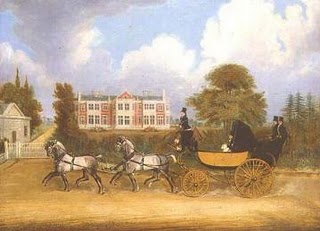 |
| Trafalgar Square during the Poll Tax riots of 1990. |
Coffee, tea, soap, French rum and silk.
Which item earned the most for the exchequer and which the least?
[Answers at the end of this blog post.]
With yet more news this week of financial meltdown, and the second Greek bail-out, my thoughts for the weekend blog post naturally turned to taxes.
Tithes and taxes have existed for as long as history, but I was a little shocked to learn that the average medieval serf, actually paid a smaller proportion of his income in tax than we do today!
There have been many and various taxes over time. The Poll Tax, instituted by Margaret Thatcher in 1990, was actually a revival of an unsuccessful tax from the 1690’s, which was abandoned in 1698 after a Peasants’ Revolt. Other unpopular 17th century taxes, which Mrs Thatcher wisely decided against reviving, were a hearth or chimney tax (2 shillings per hearth) and a window tax (A tax per window– this tax was only abolished in 1851)
 |
| A typical Georgian building with a window bricked up to avoid tax. |
One of the main drains on the resources of the British treasury - was war. In 1697 the annual tax yield had to more than double, from 2 million to 4.8 million GBP, to cover the cost of war with France
In the 18th century the main direct tax was the Land Tax, on the amount of property you owned, with special taxes on stamped paper, hackney carriages, births, deaths, marriages, bachelors, tobacco pipes and stamp duty on documents.
 |
| There was tax to be paid for painting your coat-of-arms on your carriage. |
Some of the more unusual taxes included paying for a licence to display a coat of arms on the side of your carriage. The number of licenses rose from 14,000 in 1812 - to 24,000 in 1831. In 1830 some 7,000 people paid to be able to print their crest on headed notepaper or have it engraved on cutlery – by 1868 this rose to over 68,000 people.
 |
| A Gillray cartoon referring to William Pitt's policy on Income Tax |
Income tax was the invention of William Pitt the Younger, introduced in 1799 to cover the cost of the Napoleonic Wars. Yearly incomes below 60 GBP were exempt – a sliding scale up to 200 GBP, and then 10% levied on incomes above this. It was abolished in 1816, but reintroduced in 1842 by Sir Robert Peel, as part of his measures to reduce the duties on common goods. The tax on soap was removed in 1853…
The answer to the question posed at the beginning of this post, and it surprised me, was TEA which brought in the most at 3,832,432 British pounds - with SILK the least earning just 214,898 pounds worth of tax.
 |
| Gorgeous silk gowns like this, generated less tax income than soap! |
The worth in tax to early 19th century Great Britain
(MOST) Tea > rum > soap > coffee > silk. (LEAST)In a way it’s heartening to see soap holding it’s own…at least that means somebody was buying it!


Interesting blog and the pictures are wonderful. Would love to be able to wear that dress. Some things never change - like taxes. Wasn't the stamp tax the excuse we American's used to start the revolution? I can't remember anymore.
ReplyDeletehttp://karenvwasylowski.blogspot.com
http://britsunited.blogspot.com
A window tax? That's very harsh. Thanks for teaching me something new today!
ReplyDeleteKaren, that dress is to die for...you'd have to have the right occaision though...a bit overdone for Tesco's.
ReplyDeleteCharmed Lassie - I did an earlier post that was just about the Window Tax - 'Daylight Robber' - as people at the time called it.
Really interesting, great pictures too. Always love your posts.
ReplyDeletei found this post very interesting. thank you for that.
ReplyDeleteKaren, tea. We dumped their tea so we didn't have to pay the tax. Unless that was some sort of blown out of proportion story like Thanksgiving. Thanksgiving began, not with the Pilgrims and "Indians", but as a story in a book. lol. We tend to believe anything we hear 200 years later.
ReplyDeleteOne of the detriments of writing fiction. Someday someone may believe in my fiction characters as real. :p
Grace, thanks for the interesting information!